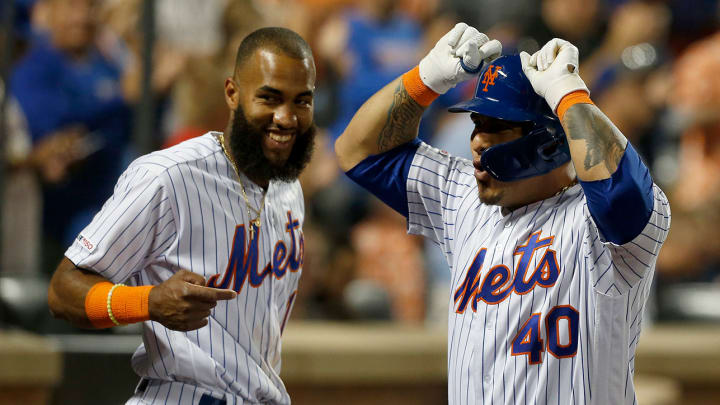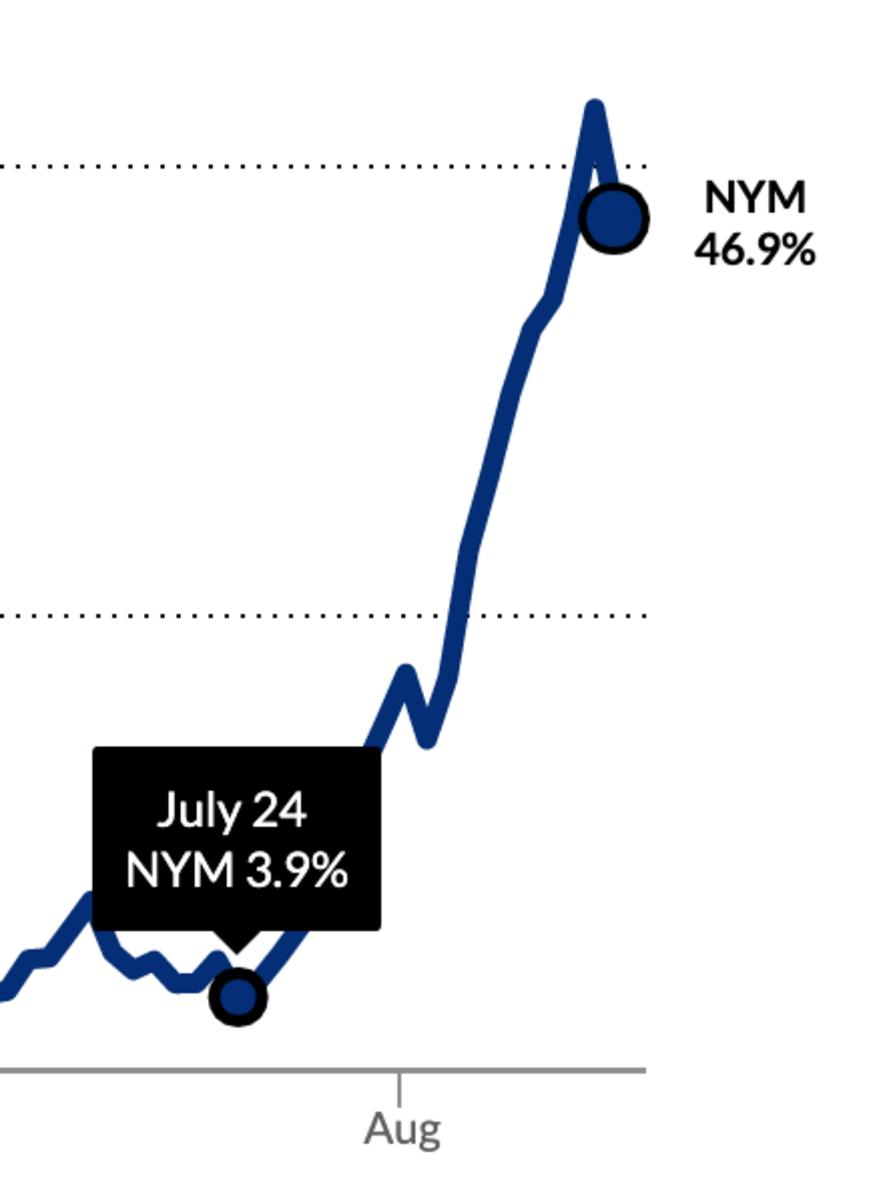Who's Going to Win the Chaotic NL Wild-Card Race?

The National League wild-card race is a big stupid mess. With Sunday’s games in the books, six teams are within five games of the second spot, with Washington and St. Louis hanging onto postseason positions for dear life. How long they can dig their fingernails into the cliff for the next six-plus weeks depends on whether the group behind them can put together a run. The Mets are the latest of those clubs to get red-hot, but even that blazing stretch has only put them in the thick of the race instead of at the top of the heap.
Is there a favorite, though, in that stew of squads? To find out, let’s dive into each of the eight teams still vying for the two wild-card spots and decide which pair are the better bets to play on into October. The playoff odds below originate from FanGraphs' projection.
Cincinnati Reds
56–60, 5 GB of second wild-card
Odds to win wild-card: 5.1%
The Case For: Cincinnati boasts one of the best rotations in the NL with Trevor Bauer, Luis Castillo and Sonny Gray. The numbers suggest that the Reds are better than their record, with a plus-39 run differential that translates to an expected 62–54 mark. Plus, 33 of their remaining 46 games will be against fellow wild-card contenders, so they’ll have plenty of chances to make up ground.
That's a HAT TRICK of home runs for Aristides Aquino!#BornToBaseball pic.twitter.com/9LY1rgBjUI
— Bally Sports Cincinnati (@BallySportsCIN) August 11, 2019
The Case Against: The alternate universe Reds playing up to that run differential would have inspired paeans to the virtues of trying in the offseason (and they still deserve kudos for that). But the Reds of this reality are pretty average, with one full above-.500 month all year. Even the arrival of a time-traveling Babe Ruth disguised as someone named Aristides Aquino hasn’t been enough to get Cincinnati and its weak lineup going. At some point, you are what your record says you are.
The Verdict: Barring Aquino actually being the reincarnation of Barry Bonds, the Reds are likely toast.
San Francisco Giants
59–60, 3 1/2 GB of second wild-card
Odds to win wild-card: 1.4%
The Case For: Madison Bumgarner and Jeff Samardzija offer plenty of veteran grit atop the rotation—one that’ll soon add Johnny Cueto. The bullpen, even after shedding pieces at the deadline, is one of the league’s best. And thanks to a revamped lineup featuring unlikely contributors like Alex Dickerson and Mike Yastrzemski, San Francisco’s offense has been upgraded from stable to frisky.
Will Smith's first Major League:
— SFGiants (@SFGiants) August 12, 2019
✅ At bat
✅ Hit
✅ RBI
#SFGiants pic.twitter.com/aNuU32wWOk
The Case Against: A white-hot July gave way to an August in which the Giants morphed back into their April-through-June selves, with a 4–7 record so far. The rotation behind Bumgarner and Samardzija—a who’s who of who cares—is awful. Buster Posey and Brandons Belt and Crawford are rocking sub-.700 OPS figures in August—a big part of why San Francisco is averaging just three runs per game this month. The mirage that was the Giants as contenders was built on either the super-subs never cooling down or the established stars re-emerging when that happened. The latter looks increasingly unlikely, and the former is a bad bet going forward.
The Verdict: If Farhan Zaidi can find a way to make it 2014 again, I like their chances.
Arizona Diamondbacks
59–59, 3 GB of second wild-card
Odds to win wild-card: 7.7%
The Case For: The Diamondbacks have a solid lineup and a rotation that’s held its own, and while the bullpen isn’t a strength, Arizona is no fluke. If anything, the D-Backs should be better, with a run differential of plus-67 that beats those of the Braves, Red Sox and Nationals (and equals that of a 65–53 team).
At least there's a World Series banner from this century. pic.twitter.com/6RLSGdByIT
— Arizona Diamondbacks (@Dbacks) August 10, 2019
The Case Against: Arizona’s front office didn’t seem to believe in itself, trading away Zack Greinke at the deadline despite being within three games of a playoff spot. That alone limits the D-Backs’ ceiling going forward. And despite the underlying positive metrics, this is still a .500 squad, and that’s with a lot of unexpected things going right.
The Verdict: The Diamondbacks keep hanging around—they took two of three from both the Nationals and Phillies to start the month—but seem to lack the extra gear necessary to chase down the leaders and are running out of time to find it.
Philadelphia Phillies
60–58, 2 GB of second wild-card
Odds to win wild card: 5.8%
The Case For: How can a team with Bryce Harper, Rhys Hoskins, J.T. Realmuto, Jean Segura and Aaron Nola be bad? That core is reason enough to believe in the Phillies, who even amid a rough season can roll out multiple All-Stars in the lineup and a legit ace atop the rotation.
The Case Against: Here’s a good representation of Philadelphia’s 2019 season:
The Phillies excel only at making bad situations worse. Even with all those stars, the offense has been average at best. The rotation beyond Nola is so bad that it includes the 2019 versions of Jason Vargas *and* Drew Smyly, and they represent the best that Philadelphia can do there. The bullpen, which has been torn apart by injuries, is a tire fire covered in nuclear waste. For any step forward the Phillies take, they subsequently turn around and take two back.
The Verdict: Nothing about the Phillies since the end of May suggests any kind of sustainable competence. They gave up a two-run single to a reliever on Sunday, for crying out loud. This conversation is over.
New York Mets
61–57, 1 GB of second wild-card
Odds to win wild card: 43.3%
The Case For: Clearly some demonic force has seized control of the Mets, because I don’t have any other explanation for what’s gotten into them. A ridiculous 21–7 since the All-Star break and 9–2 in August, New York is suddenly a legit contender, with playoff odds that got strapped to a Titan IV rocket a week before the deadline.

The Mets are wildly top heavy, but that top has performed so well that it’s made up for the dead weight on the roster. No contender has a better starting five, and Jacob deGrom (a 1.35 ERA since the start of July) is once again doing his best Pedro Martinez impersonation. The lineup, meanwhile, is firing on all cylinders and contributing timely hits to start late rallies. After a familiarly grim start to the year, there’s a new aura about this team.
Eight is GREAT! 🙌 #MetsWin!
— New York Mets (@Mets) August 11, 2019
FINAL: #Mets 4 - Washington 3
Box: https://t.co/9WO8DGAexf pic.twitter.com/5VG5QRBg6A
The Case Against: These are still the Mets, and expecting doom is always the safe play. The main problem is how thin the roster is. Half the lineup can’t hit, the bullpen is a fire hazard, and while the rotation is strong, it’s injury-prone with zero available reinforcements. They also built that huge hot streak on some awful competition: This weekend’s series against the Nationals was their first against an above-.500 team in nearly a month. Much tougher awaits down the stretch.
The Verdict: I absolutely do not want to trust the Mets, but I can’t discount how good they’ve been—or, perhaps more importantly, how bad the other wild-card teams are. I think they win the second spot.
Milwaukee Brewers
62–57, ½ GB of second wild-card
Odds to win wild-card: 19.3%
The Case For: Christian Yelich, Christian Yelich and Christian Yelich. The 2018 NL MVP is having a bananas season with 39 homers, a 185 OPS+ and 6.1 bWAR. He’s almost single-handedly keeping Milwaukee alive, though he’s getting help of late from Keston Hiura (.316/.392/.632 since his June 28 call-up).
Eric Thames wasn't interested in extra innings tonight! #ThisIsMyCrew pic.twitter.com/AEE0jeZnHN
— Milwaukee Brewers (@Brewers) August 10, 2019
The Case Against: The lineup isn’t a lost cause between Yelich, Hiura, Yasmani Grandal, Eric Thames and Mike Moustakas, but the rotation and bullpen sure are. Brandon Woodruff’s oblique injury was a blow that Milwaukee couldn’t afford, and a relief corps that couldn’t be touched last year is a mess, posting a 4.58 ERA on the season—and that’s *with* Josh Hader. But even he’s faltered, with a 5.52 ERA since the beginning of July.
The Verdict: Even with Yelich, the Brewers look weak. Oddly, their chances might be better at the NL Central title, as they have 16 games left against the Cardinals and Cubs.
St. Louis Cardinals
61–55, second wild-card (½ GB first wild-card)
Odds to win wild-card: 23.9%
The Case For: St. Louis went 16–9 in July and has played like a 96-win team since the All-Star break. That’s thanks largely to Paul Goldschmidt remembering that he’s Paul Goldschmidt (.288/.330/.615, 10 homers in the second half) as well as the return of Marcell Ozuna from the injured list. The bullpen has been a strength in that time as well. Also, the Cardinals are practitioners of black magic, so doubt them at your own risk.
LANE FOR THE LEAD! pic.twitter.com/b0jI1bxKJe
— St. Louis Cardinals (@Cardinals) August 11, 2019
The Case Against: When I say “the bullpen has been a strength,” a caveat: the bullpen not including Andrew Miller (4.22 ERA in the second half), Carlos Martinez (5.25) and John Gant (5.40). Given that those three pitch a lot of the high-leverage innings in St. Louis, that’s a bit of a problem. So, too, is the weak rotation. It’s honestly a surprise that the Cardinals are actually contending with such woeful pitching.
The Verdict: Like the Brewers, the Cardinals are better bets in the Central by virtue of having seven games left against the Cubs, all in the last 10 days of the season. But I don’t like their wild-card chances if they fall out of the division race.
Washington Nationals
62–55, first wild-card
Odds to win wild-card: 62.4%
The Case For: Washington has the best top three of any rotation in baseball in Max Scherzer, Stephen Strasburg and Patrick Corbin. It has two MVP-caliber hitters in Anthony Rendon and Juan Soto. The bullpen … well, it’s still kind of bad overall, but that’s a big step up from the leaky gasoline can it was in April and May. No team in the race has more overall talent.
🗣️ PUT A #CURLYW IN THE BOOKS!
— Washington Nationals (@Nationals) August 11, 2019
FINAL // #Nats 7, Mets 4 pic.twitter.com/dysAEaqRx7
The Case Against: Scherzer has been out since the end of July with a back strain and likely won’t be back for another couple of weeks. It doesn’t help that the bullpen lacks impact arms beyond Sean Doolittle. The late innings are going to be a perpetual wobble for Washington, putting the pressure on Scherzer, Strasburg and Corbin to pick up as many outs as humanly possible.
The Verdict: Like the Mets, the Nationals benefit from the rest of the wild-card competition being thoroughly mediocre. I think they hang on, creating a must-watch matchup between Scherzer and deGrom in the wild-card game.
